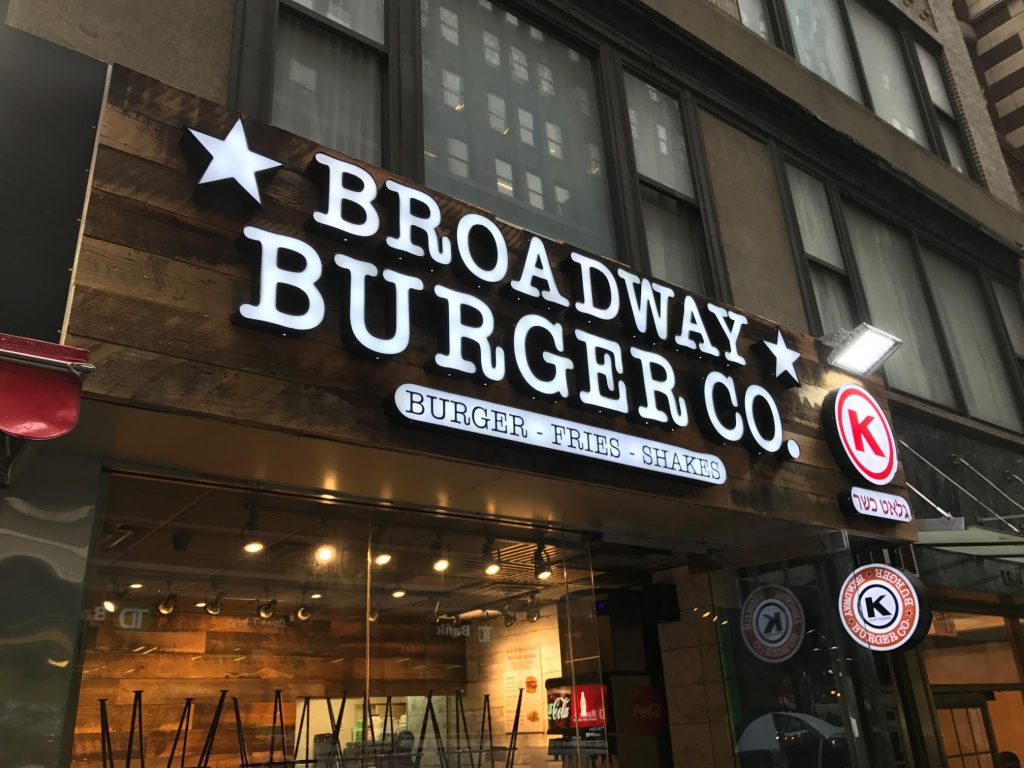 After the recent closure of Shuk Falafel in Midtown Manhattan, its next door kosher restaurant, Broadway Burger Co., will be closing as well on Sunday, 1/28.
After the recent closure of Shuk Falafel in Midtown Manhattan, its next door kosher restaurant, Broadway Burger Co., will be closing as well on Sunday, 1/28.
The kosher certifying agency which certified both restaurants is requesting that the restaurant make changes or close the kosher restaurant since Shuk is being converted into a non-kosher eatery, and this may cause Ma’arat Ayin issues with the owner owning both a kosher and non-kosher restaurant adjacent to each other.
The burger joint was doing well in the year that it was open, so this closing is unfortunate.






If there is Ma’arat Ayin issues due to the owner owning both a kosher and non-kosher restaurant adjacent to each other, you place cameras where you can see all exits. On the back exit, you place an alarm so that the full-time mashgiach is alerted and he can access immediately via a smartphone a video that can see who is entering or exiting. The back exit MUST NOT be locked as that would violate NY City Fire Codes. A contract between the kashrut agency and the owner with a lawyer present, which stipulates that if there is a first time violation the supervision will be pulled and there will be a most hefty fine. The supervisor for the onsite mashgiach also needs to visit the operation to check on his mashgiach and to do a walk around.
Your comment addresses the important issue of trying to be sure traffic isn’t mixed with kosher in the adjoining restaurants. But I’m confused about Ma’arat Ayan. How exactly does it apply here?
Rabbi Ovadia Yosef, ztk”l writes [[Yabi’a Omer 6, Yoreh De’ah 8. Look in Yechaveh Da’at 3:59, where Rabbi Yosef argues that it might be permissible to actually cook with such products based on their prevalent usage. However, he does not rule unequivocally in this matter. In practice, it is common for soy milk, etc., to be used in meat dishes.]] that a restaurant may serve non-dairy creamer with the coffee served at meat meals. This is because nowadays these creamers (and non-dairy milk) are common, and because the person is not actually eating it with the meat.
In fact, I heard from Rabbi Avrohom Tzvi Wozner of Monsey, New York, that nowadays any non-dairy milk or cheeses which are common may be used with meat. Due to their prevalence, people will not suspect that they are actually dairy.
Rabbi Moshe Feinstein, ztk”l [[Igrot Moshe, Orach Chaim 2:40; see there regarding cases of great need.]] ruled that one may not eat in a non-kosher restaurant even if he can ensure that all of the food being served to him is kosher.
Rabbi Moshe Feinstein, ztk’l writes[[ Igrot Moshe Even Ha’Ezer 2:12]]. that the laws of mar’it ayin cannot necessarily be extrapolated from one case to another. This is because some activities are more prone to be mistaken for forbidden activities then others.
I’m sorry to say, that it is some people’s nature to always cast aspersions on others as they feel they are more “frummer” than the next. I always answer these people with “Tzadeekim Anachnu V’Lo Chatanu “AVAL” Anachnu V’avotaynu Chatanu.
If the bathroom facilities in one restaurant wasn’t working and you went into the non-kosher one and then walked back into the Kosher one, people’s nature (Yetzer HaRa) from the outside will assume you tried one restaurant and now you are trying the other.
So don’t give someone a hechsher because someone may use the bathroom in the other unit? Just require them to keep the communicating door locked at all times. Seems like a simple solution to me.
You are assuming too much, which is wrong. DON’T!! There is NO physical connection between the two restaurants, so there is NO communicating door. An individual walks out of one restaurant and into the restaurant next door which would cause someone from the outside that is unfamiliar with the situation to make some inappropriate assumptions (Ma’Arit Ayin.) The average person’s mind is not on the level of a Rav Ovadia Yosef, ztk”l or a Rav Moshe Feinstein, ztk”l or Rav Chaim Pinchos Scheinberg, ztk”l .
By that rationale we shouldn’t have any kosher restaurants because most are next to non-kosher restaurants and one may use the bathroom there. I don’t understand why this is any different than any other kosher establishment next to a non-kosher one (such as Mr. Broadway or Jerusalem Cafe).
Neither you or I know the entire history of these two restaurants with the mashgiach or the supervisory agency. Try working in a restaurant or with a catering outfit and you will be surprised how many interesting things are either presented to the mashgiach, the mashgiach unintentionally doesn’t see (the kitchen staff hid something and when s/he leaves, produces it) there are other scenarios. In this particular case, both restaurants are next to each other, same owner and both restaurants were known as kosher. Now this has changed as you will have one restaurant being Kosher approved and the other NOT Kosher. The issue is that both eating establishments are next to each other and compounded with being owned by the same owner.
Previously, both restaurants could in reality pass anything and everything back and forth to each other and now, with one of the restaurants changing to NOT KOSHER it now presents a problem to the staff of both. As exists in most kosher restaurants today, in the US and outside, the kitchen staff are generally NOT JEWISH so they are now presented with a new concept. New orders: NOTHING IS TO BE SHARED BETWEEN THE TWO RESTAURANTS AND I MEAN NOTHING!
The issue is that both eating establishments are next to each other and compounded with being owned by the same owner.
1 – The fact that neither you or I know the entire history (or even a small part of it) is a given. If I knew then I would not have asked the question.
2 – I am asking a question to try to understand how a concept is being applied in a particular case. I fully realize that there are very few people with the proper knowledge to answer this question and I further realize that the few who know may not be able to talk about it for various reasons (legal and halachic).
3 – I also know that it is highly unlikely I get an answer about this case specifically.
4 – I have not said anything accusatory about anybody involved. I have not blamed the mashgiach or the supervisory agency (or even the owner) for any wrongdoing (as your responses have implied).
5 – It is also obvious that you don’t know the answer in this case. And that is fine. I do not know you or anything about your background or qualifications but I assume based on some of the things you’ve said that you know what you are talking about with regard to kashrus in general but that you don’t have any knowledge of this case beyond what the general public knows. Again, that is fine. But if you don’t know then please stop trying to answer a question you don’t have the answer for.
Response: 4 – “I have not said anything accusatory about anybody involved. I have not blamed the mashgiach or the supervisory agency (or even the owner) for any wrongdoing (as your responses have implied)”
I implied no negativity towards the mashgiach that had been assigned to either restaurant or the supervisory agency while they were operational. I did say, that is if you are capable of recalling, that the mashgiach, “”should they consider reopening”” where one restaurant is kosher & the other restaurant is not kosher under the same ownership that mashgiach will have to grow another set of eyes. I also stated that cameras need to be installed so that there is a full visual of the back door where a fire type alarm has to be installed where when the door is opened a loud alarm goes off alerting the mashgiach and staff that someone is exiting the restaurant through the back door for whatever reason.
5- if you don’t know then please stop trying to answer a question you don’t have the answer for. – I find your response to be chuzpadik and lacking in derech eretz. You sound like an Am Haaretz.
I remember during one of my trips to Eretz Yisrael, a seminary girl was sitting at the table talking to the family where I was staying. She knew that the family was going back to the US for a small trip to see family and most likely would be invited to her family’s house for a meal. She said to the lady of the house that should her mother offer a fresh fruit salad that the fruits wouldn’t be checked as thoroughly as she checked in her own house. The seminary girl’s family are very religious and father went to Lakewood but Americans up until now didn’t check their vegetables or fruits as well as they did in Eretz Yisrael. For that matter, until Rabbi Herman started to publish his Kemach Yoshen list, no one was in the know in regards to observing Yoshon. This situation exact situation has happened dozens of times before in different cities and I know of the cases personally.
I noticed you didn’t comment on the Jin Glatt Kosher Chinese Restaurant in Passaic, New Jersey that closed. The whole thing was an embarrassment not to the owners but to the kashrut agency who should’ve been on top of things. They called in everybody to solve the mystery and it wasn’t necessary if they would’ve initially put into place precautionary barriers.
I can tell that you’ve never worked on a ship, with a caterer or in a restaurant where kashrut situations would present themselves. Assumptions can get you into trouble, be sure next time